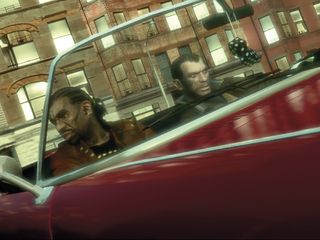
Wandering into a videogame shop can be a pretty depressing experience – and not just because it takes four hours to get to the checkout. £34.99 for Mass Effect? £49.99 for a console game?
And those price tags tend to stay the same, at least until savage reviews tell everybody the game's a duffer and the shops cut its price in panic. Still, there's always the pre-owned section, where you can get the same game with added scratches, bashes and jammy fingerprints. The savings? A few quid if you're lucky. Somebody's having a laugh, but who? And why?
Games are costly, and the obvious reason is that they're expensive to make. The days when industry-defining hits were the creations of bored teenagers hammering away on home computers are long gone. Today, a games studio is more like a film studio, with huge teams spending years on a single project. Budgets in the tens of millions aren't unusual, and that means games have to sell an awful lot of copies just to break even. The overwhelming majority simply don't.
Even many of the bigger names still coast from project to project, struggling to keep afloat. Most recently, Flagship – the creator of Hellgate: London, largely made up of Blizzard alumni – closed its doors after just one game. Ritual, a group of successful FPS developers who'd worked on licences such as Quake, Heavy Metal and Star Trek, collapsed after the launch of the first episode of its new SiN series, and met the most humiliating fate of all – being bought by a casual games company
Everyone wants a cut
There's more to it than that, though, because every other type of entertainment technology – from music formats to DVD – has become cheaper over the last couple of decades, despite ever-growing budgets. Games haven't, and one of the main reasons for this is the sheer number of people with their fingers in the money pie.
Take stores. When you buy a game from a shop, the retailer keeps around 20 per cent of the money. That isn't pure profit, though: retailers have to pay for staff, marketing, premises and all the other costs of running a business, including tax. That's why offshore, Internet-only retailers can sell games much more cheaply without immediately going out of business.
Get daily insight, inspiration and deals in your inbox
Get the hottest deals available in your inbox plus news, reviews, opinion, analysis and more from the TechRadar team.
Digital distribution is even better. Bandwidth isn't a huge deal when you're buying that much of it, saving a fortune in packing, postage and other materials. Valve's Steam is the most famous of these services.
Sometimes the retailer takes even more money. If the game gets a snazzy display, the retailer will often expect a contribution towards the cost. In some cases, retailers might ask for an extra bit of cash just to stock a game, safe in the knowledge that if they don't stock it, it won't sell. As for those Top Ten racks and similar promotions, they're not always based on sales…
The munch bunch
Once the retailer has taken its cut, there are plenty of other people waiting in line. The distributor gets a share, which equates to 1-2 per cent of the retail price. The publisher takes a similar cut, and a further 5 per cent goes to pay for the manufacturing and packaging. Attention-grabbing box designs and limited editions such as a copy of Halo in a metallic space helmet will obviously cost more.
What's left of the money at this stage finally goes back to the game developer, at which point it's divided further. If the developer has used someone else's game engine – which many do because it works out much cheaper than building their own – then they'll have to pay a royalty to the owner, and if the game uses characters or content that belongs to someone else (such as comic book superheroes, characters from films or music from big-name artists) then that's another royalty payment. Engine and character licences can each account for around 5 per cent of the total price.
Most Popular

